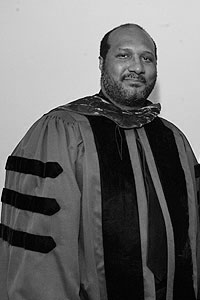
Philosophy professor Lewis Gordon, Ph.D. has been an authority on race relations for the better part of the past two decades. After receiving his Ph.D. from Yale University in 1993, Gordon taught at Brown University, Purdue University and Yale, before joining Temple in 2004.
In addition to his time as a philosophy professor, Gordon is also the director of both the Center for Afro-Jewish Studies and the Institute for the Study of Race and Human Thought.
Gordon recently spoke out about the controversial killing of Trayvon Martin in Florida, and The Temple News caught up with him to get his opinion on the murder and the significance the incident has for the nation as a whole.
The Temple News: What does your research and work focus on?
Lewis Gordon: My research work focuses on the complexity of understanding human beings and how that understanding relates to our overall understanding of knowledge.
TTN: You talk about understanding how we are as a people, what got you into that field of study?
LG: It actually goes all the way back to before I went to graduate school. I created a school in New York for kids nobody wanted to teach and I noticed that the students were supposed to be very difficult. I was told that if my program was 10 percent successful, then it was a successful program. But we were 85 percent successful. One of the reasons we were so successful was that we really respected and enlarged the humanity of our students.
So I became interested in the question of human potential and when I went to graduate school I decided to focus on that question.
TTN: You recently spoke out about the Trayvon Martin shooting. What are your feelings on the incident?
LG: The first thing is that I won’t say they’re feelings, one of the big problems and the trap about how we talk about racism at its face is that we tend to put it in the language of feelings, which oversuggestivizes it. There are times when certain situations are truly racist activities. What it does is undermine the value of the people who are victimized or oppressed by racist activities. When people were lynched, it wasn’t a feeling it was a reality. Similarly, this is a lynching. This individual accosted this young man.
What’s not often paid attention to is that Trayvon Martin is 17 years old. If you’re 17 years old walking at night and you have a man following you, you don’t know if he’s a molester, a mugger or whatever. So, the only person defending himself was Trayvon Martin.
We know the scenario would have been different if those police showed up and there’s a black guy standing over a white teenage boy.
One of the things that’s complicated there is that some people don’t understand is the distinction between white supremacy and anti-black racism. One could reject white supremacy and be an anti-black racist. As we know, within other racial groups, for instance, Asian-Americans or Latinos or even the Native Americans, there are anti-black racists.
TTN: What do you think this incident says about the country as a whole? Is it an isolated incident or something that has happened across the country?
LG: What it tells me about the nation as a whole is that [we see it in] the criminal justice system in which a lot of black people are in prison for crimes they didn’t commit or through the [conviction] of many minor crimes that many whites do not get convicted for daily. It’s a reflection of a country that doesn’t value the life of its black citizens, that’s what it tells me.
TTN: What can students and people on Main Campus do to bring this incident to light?
LG: I think what’s different today is that a lot of the outcry on Facebook and the Internet and in protests, are happening by white and brown and whatever color you would like, citizens and students. The national outcry has been commendable. I think students should continue doing what they’re doing, become informed and articulate their focus about this.
Sean Carlin can be reached at sean.carlin@temple.edu.


Be the first to comment